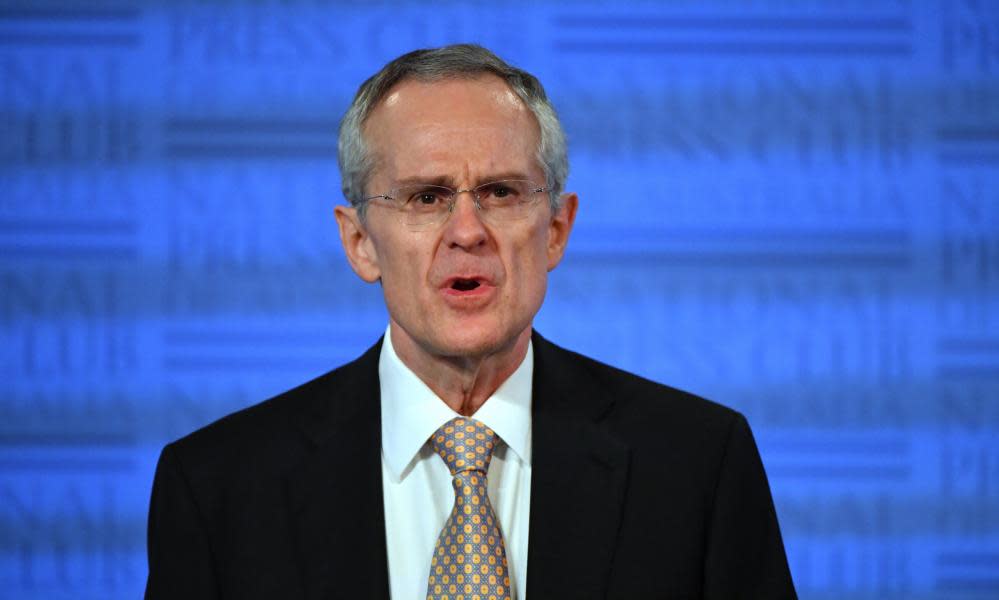ACCC puts News Corp on notice that it's closely watching newswire duel

Australia’s competition watchdog has put News Corp on notice, warning it will closely monitor how the company’s recently established newswire competes with the salvaged news agency Australian Associated Press.
Rod Sims, the head of the Australian Competition and Consumer Commission, said he was mindful of the fact AAP was “effectively now a new player” after a consortium of investors saved it from closure earlier this year.
“We just want to make sure there is not behaviour by other players that sees it knocked out of business,” he told the National Press Club in Canberra on Wednesday.
“We will be looking very carefully at just how other players might engage with the media that might have that effect. So we will watch very carefully.”
Related: 'Culture of fear': why Kevin Rudd is determined to see an end to Murdoch's media dominance
Sims made the comments in response to questions about how he would monitor competition between News Corp and the newswire it previously part-owned, AAP.
News Corp no longer uses content from AAP and instead has set up its own rival news wire. It will seek to sign up external media companies to NCA News Wire when its non-compete clause expires at the end of the year.
But while signalling his interest in monitoring the situation, Sims was broadly positive about the overall shape of the media landscape in Australia, arguing it was more diverse than it was decades ago.
Diversity of media ownership in Australia is in the spotlight again as the former prime minister Kevin Rudd’s push for a royal commission into the concentration of the sector gathers public support. Rudd’s petition, hosted on the Australian parliament’s website, has so far attracted support from 360,000 people.
Rudd’s petition sounds alarm that Australia’s print media is overwhelmingly controlled by News Corp, with around two-thirds of daily newspaper readership and power that’s “routinely used to attack opponents in business and politics by blending editorial opinion with news reporting”.
Rudd’s petition also raises deep concern about Nine Entertainment’s takeover of former Fairfax newspaper titles the Sydney Morning Herald and Melbourne’s the Age – a merger that Sims decided against blocking in 2018.
Sims said he was brought up “in the era of Murdoch and Packer” and he believed “our media is more diverse than it was then”. He pointed to the important role played by the public broadcaster the ABC, saying it had previously been focused on radio and TV but was now also effectively a print operator because of its online news service.
Sims also pointed to the increasing readership of relatively new entrants Guardian Australia and Daily Mail Australia.
“So, of course, more diversity in media is better than less, but I think we have more diversity now than in the past and I suspect in the digital world we will get even more.”
Sims also hinted on Wednesday he was open to changes to the way disputes would be resolved under the proposed media bargaining code, which aims to ensure Google and Facebook pay for the value they receive from distributing Australian journalism.
The move has triggered a furious pushback and lobbying effort by the big digital platforms.
The ACCC boss said the final code needed to include a method to resolve disputes, but he hinted he was not wedded to the “final offer arbitration” that the platforms have rejected as unsuitable.
“I’m simply saying that arbitration matters … the form of the arbitration is an issue that you can debate,” he said.
Under the draft code, platforms must first negotiate with media companies, either individually or collectively, but an arbitrator is appointed if no agreement is reached after three months.
Related: If Facebook and Google limit services in Australia, could the ABC run a social network?
Each side submits a final offer and the arbitrator must choose the most reasonable, rather than coming to some sort of compromise decision part-way between the two offers. This form of arbitration originated in Major League Baseball salary negotiations.
Sims said there was no point having a consultation process unless you were open to changes, and said the lobbying effort by the big platforms had not caused any delays.
He would not be drawn on whether the ABC and SBS should be included in the media code – as argued by Labor and the Greens – saying there were arguments on both sides and final decisions would be up to government.
Labor, the Greens and several crossbenchers have suggested that the ABC and SBS could be added to the ranks of Australian news publishers to benefit from the code, in the interests of helping to gain broad cross-party support for the legislation.
Last month the communications minister, Paul Fletcher, left the door open to including the ABC and SBS in the new code and refining the arbitration process, before introducing legislation to parliament later this year.
The tech giants have mounted a public campaign against the proposed media industry code, with high-profile ads appearing on Google and YouTube, and Facebook threatening to block all Australians from sharing news on its platform. The government has declared that it “won’t be bullied”.

 Yahoo News
Yahoo News 
